Chronology of Football (1960-1979)
1960
Pete Rozelle was elected NFL Commissioner as a compromise choice on the twenty-third ballot, January 26. Rozelle moved the league offices to New York City.
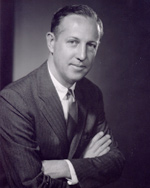
Pete Rozelle
Lamar Hunt was elected AFL president for 1960, January 26. Minneapolis withdrew from the AFL, January 27, and the same ownership was given an NFL franchise for Minnesota (to start in 1961), January 28. Dallas received an NFL franchise for 1960, January 28. Oakland received an AFL franchise, January 30.
The AFL adopted the two-point option on points after touchdown, January 28. A no-tampering verbal pact, relative to players' contracts, was agreed to between the NFL and AFL, February 9.
The NFL owners voted to allow the transfer of the Chicago Cardinals to St. Louis, March 13.
The AFL signed a five-year television contract with ABC, June 9.
The Boston Patriots defeated the Buffalo Bills 28-7 before 16,000 at Buffalo in the first AFL preseason game, July 30. The Denver Broncos defeated the Patriots 13-10 before 21,597 at Boston in the first AFL regular-season game, September 9.
1961
The Houston Oilers defeated the Los Angeles Chargers 24-16 before 32,183 in the first AFL Championship Game, January 1.
Detroit defeated Cleveland 17-16 in the first Playoff Bowl, or Bert Bell Benefit Bowl, between second-place teams in each conference in Miami, January 7.
End Willard Dewveall of the Bears played out his option and joined the Oilers, becoming the first player to move deliberately from one league to the other, January 14.
Ed McGah, Wayne Valley, and Robert Osborne bought out their partners in the ownership of the Raiders, January 17. The Chargers were transferred to San Diego, February 10. Dave R. Jones sold the Browns to a group headed by Arthur B. Modell, March 22. The Howsam brothers sold the Broncos to a group headed by Calvin Kunz and Gerry Phipps, May 26.
NBC was awarded a two-year contract for radio and television rights to the NFL Championship Game for $615,000 annually, $300,000 of which was to go directly into the NFL Player Benefit Plan, April 5.
Canton, Ohio, where the league that became the NFL was formed in 1920, was chosen as the site of the Pro Football Hall of Fame, April 27. Dick McCann, a former Redskins executive, was named executive director.
A bill legalizing single-network television contracts by professional sports leagues was introduced in Congress by Representative Emanuel Celler. It passed the House and Senate and was signed into law by President John F. Kennedy, September 30.
Houston defeated San Diego 10-3 for the AFL championship, December 24. Green Bay won its first NFL championship since 1944, defeating the New York Giants 37-0, December 31.
1962
The Western Division defeated the Eastern Division 47-27 in the first AFL All-Star Game, played before 20,973 in San Diego, January 7.
Both leagues prohibited grabbing any player's facemask. The AFL voted to make the scoreboard clock the official timer of the game.
The NFL entered into a single-network agreement with CBS for telecasting all regular-season games for $4.65 million annually, January 10.
Judge Roszel Thompson of the U.S. District Court in Baltimore ruled against the AFL in its antitrust suit against the NFL, May 21. The AFL had charged the NFL with monopoly and conspiracy in areas of expansion, television, and player signings. The case lasted two and a half years, the trial two months.
McGah and Valley acquired controlling interest in the Raiders, May 24. The AFL assumed financial responsibility for the New York Titans, November 8. With Commissioner Rozelle as referee, Daniel F. Reeves regained the ownership of the Rams, outbidding his partners in sealed-envelope bidding for the team, November 27.
The Dallas Texans defeated the Oilers 20-17 for the AFL championship at Houston after 17 minutes, 54 seconds of overtime on a 25-yard field goal by Tommy Brooker, December 23. The game lasted a record 77 minutes, 54 seconds.
Judge Edward Weinfeld of the U.S. District Court in New York City upheld the legality of the NFL's television blackout within a 75-mile radius of home games and denied an injunction that would have forced the championship game between the Giants and the Packers to be televised in the New York City area, December 28. The Packers beat the Giants 16-7 for the NFL title, December 30.
1963
The Dallas Texans transferred to Kansas City, becoming the Chiefs, February 8. The New York Titans were sold to a five-man syndicate headed by David (Sonny) Werblin, March 28. Weeb Ewbank became the Titans' new head coach and the team's name was changed to the Jets, April 15. They began play in Shea Stadium.
NFL Properties, Inc., was founded to serve as the licensing arm of the NFL.
Rozelle indefinitely suspended Green Bay halfback Paul Hornung and Detroit defensive tackle Alex Karras for placing bets on their own teams and on other NFL games; he also fined five other Detroit players $2,000 each for betting on one game in which they did not participate, and the Detroit Lions Football Company $2,000 on each of two counts for failure to report information promptly and for lack of sideline supervision.
Paul Brown, head coach of the Browns since their inception, was fired and replaced by Blanton Collier. Don Shula replaced Weeb Ewbank as head coach of the Colts.
The AFL allowed the Jets and Raiders to select players from other franchises in hopes of giving the league more competitive balance, May 11.
NBC was awarded exclusive network broadcasting rights for the 1963 AFL Championship Game for $926,000, May 23.
The Pro Football Hall of Fame was dedicated at Canton, Ohio, September 7.
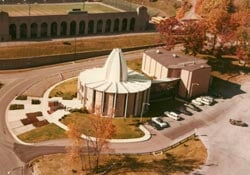
The Pro Football Hall of Fame in Canton, Ohio opened on Sept. 7, 1963. A charter class of 17 members was enshrined that day.
The U.S. Fourth Circuit Court of Appeals reaffirmed the lower court's finding for the NFL in the $10-million suit brought by the AFL, ending three and a half years of litigation, November 21.
Jim Brown of Cleveland rushed for an NFL single-season record 1,863 yards.
Boston defeated Buffalo 26-8 in the first divisional playoff game in AFL history, December 28.
The Bears defeated the Giants 14-10 in the NFL Championship Game, a record sixth and last title for Halas in his thirty-sixth season as the Bears' coach, December 29.
1964
The Chargers defeated the Patriots 51-10 in the AFL Championship Game, January 5.
William Clay Ford, the Lions' president since 1961, purchased the team, January 10. A group representing the late James P. Clark sold the Eagles to a group headed by Jerry Wolman, January 21. Carroll Rosenbloom, the majority owner of the Colts since 1953, acquired complete ownership of the team, January 23.
The AFL signed a five-year, $36-million television contract with NBC to begin with the 1965 season, January 29.
Commissioner Rozelle negotiated an agreement on behalf of the NFL clubs to purchase Ed Sabol's Blair Motion Pictures, which was renamed NFL Films, March 5.
Hornung and Karras were reinstated by Rozelle, March 16.
CBS submitted the winning bid of $14.1 million per year for the NFL regular-season television rights for 1964 and 1965, January 24. CBS acquired the rights to the champion-ship games for 1964 and 1965 for $1.8 million per game, April 17.
Pete Gogolak of Cornell signed a contract with Buffalo, becoming the first soccer-style kicker in pro football.
Buffalo defeated San Diego 20-7 in the AFL Championship Game, December 26. Cleveland defeated Baltimore 27-0 in the NFL Championship Game, December 27.
1965
The NFL teams pledged not to sign college seniors until completion of all their games, including bowl games, and empowered the Commissioner to discipline the clubs up to as much as the loss of an entire draft list for a violation of the pledge, February 15.
The NFL added a sixth official, the line judge, February 19. The color of the officials' penalty flags was changed from white to bright gold, April 5.
Atlanta was awarded an NFL franchise for 1966, with Rankin Smith, Sr., as owner, June 30. Miami was awarded an AFL franchise for 1966, with Joe Robbie and Danny Thomas as owners, August 16.
Field Judge Burl Toler became the first black official in NFL history, September 19.
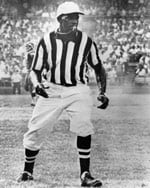
Burl Toler
According to a Harris survey, sports fans chose professional football (41 percent) as their favorite sport, overtaking baseball (38 percent) for the first time, October.
Green Bay defeated Baltimore 13-10 in sudden-death overtime in a Western Conference playoff game. Don Chandler kicked a 25-yard field goal for the Packers after 13 minutes, 39 seconds of overtime, December 26. The Packers then defeated the Browns 23-12 in the NFL Championship Game, January 2.
In the AFL Championship Game, the Bills again defeated the Chargers, 23-0, December 26.
CBS acquired the rights to the NFL regular-season games in 1966 and 1967, with an option for 1968, for $18.8 million per year, December 29.
1966
The AFL-NFL war reached its peak, as the leagues spent a combined $7 million to sign their 1966 draft choices. The NFL signed 75 percent of its 232 draftees, the AFL 46 percent of its 181. Of the 111 common draft choices, 79 signed with the NFL, 28 with the AFL, and 4 went unsigned.
Buddy Young became the first African-American to work in the league office when Commissioner Rozelle named him director of player relations, February 1.
The rights to the 1966 and 1967 NFL Championship Games were sold to CBS for $2 million per game, February 14.
Foss resigned as AFL Commissioner, April 7. Al Davis, the head coach and general manager of the Raiders, was named to replace him, April 8.
Goal posts offset from the goal line, painted bright yellow, and with uprights 20 feet above the cross-bar were made standard in the NFL, May 16.
A series of secret meetings regarding a possible AFL-NFL merger were held in the spring between Hunt of Kansas City and Tex Schramm of Dallas. Rozelle announced the merger, June 8. Under the agreement, the two leagues would combine to form an expanded league with 24 teams, to be increased to 26 in 1968 and to 28 by 1970 or soon thereafter. All existing franchises would be retained, and no franchises would be transferred outside their metropolitan areas. While maintaining separate schedules through 1969, the leagues agreed to play an annual AFL-NFL World Championship Game beginning in January, 1967, and to hold a combined draft, also beginning in 1967. Preseason games would be held between teams of each league starting in 1967. Official regular-season play would start in 1970 when the two leagues would officially merge to form one league with two conferences. Rozelle was named Commissioner of the expanded league setup.
Davis rejoined the Raiders, and Milt Woodard was named president of the AFL, July 25.
The St. Louis Cardinals moved into newly constructed Busch Memorial Stadium.
Barron Hilton sold the Chargers to a group headed by Eugene Klein and Sam Schulman, August 25.
Congress approved the AFL-NFL merger, passing legislation exempting the agreement itself from antitrust action, October 21.
New Orleans was awarded an NFL franchise to begin play in 1967, November 1. John Mecom, Jr., of Houston was designated majority stockholder and president of the franchise, December 15.
The NFL was realigned for the 1967-69 seasons into the Capitol and Century Divisions in the Eastern Conference and the Central and Coastal Divisions in the Western Conference, December 2. New Orleans and the New York Giants agreed to switch divisions in 1968 and return to the 1967 alignment in 1969.
The rights to the Super Bowl for four years were sold to CBS and NBC for $9.5 million, December 13.
1967
Green Bay earned the right to represent the NFL in the first AFL-NFL World Championship Game by defeating Dallas 34-27, January 1. The same day, Kansas City defeated Buffalo 31-7 to represent the AFL. The Packers defeated the Chiefs 35-10 before 61,946 fans at the Los Angeles Memorial Coliseum in the first game between AFL and NFL teams, January 15. The winning players' share for the Packers was $15,000 each, and the losing players' share for the Chiefs was $7,500 each. The game was televised by both CBS and NBC.
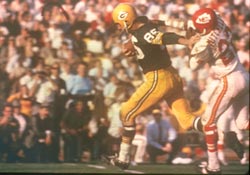
The Packers beat the Chiefs in Super Bowl I.
The "sling-shot" goal post and a six-foot-wide border around the field were made standard in the NFL, February 22.
Baltimore made Bubba Smith, a Michigan State defensive lineman, the first choice in the first combined AFL-NFL draft, March 14.
The AFL awarded a franchise to begin play in 1968 to Cincinnati, May 24. A group with Paul Brown as part owner, general manager, and head coach, was awarded the Cincinnati franchise, September 27.
Arthur B. Modell, the president of the Cleveland Browns, was elected president of the NFL, May 28.
Defensive back Emlen Tunnell of the New York Giants became the first black player to enter the Pro Football Hall of Fame, August 5.
An AFL team defeated an NFL team for the first time, when Denver beat Detroit 13-7 in a preseason game, August 5.
Green Bay defeated Dallas 21-17 for the NFL championship on a last-minute 1-yard quarterback sneak by Bart Starr in 13-below-zero temperature at Green Bay, December 31. The same day, Oakland defeated Houston 40-7 for the AFL championship.
1968
Green Bay defeated Oakland 33-14 in Super Bowl II at Miami, January 14. The game had the first $3-million gate in pro football history.
Vince Lombardi resigned as head coach of the Packers, but remained as general manager, January 28.
Werblin sold his shares in the Jets to his partners Don Lillis, Leon Hess, Townsend Martin, and Phil Iselin, May 21. Lillis assumed the presidency of the club, but then died July 23. Iselin was appointed president, August 6.
Halas retired for the fourth and last time as head coach of the Bears, May 27.
The Oilers left Rice Stadium for the Astrodome and became the first NFL team to play its home games in a domed stadium.
The movie Heidi became a footnote in sports history when NBC didn't show the last :50 of the Jets-Raiders game in order to permit the children's special to begin on time. The Raiders scored two touchdowns in the last 42 seconds to win 43-32, November 17.
Ewbank became the first coach to win titles in both the NFL and AFL when his Jets defeated the Raiders 27-23 for the AFL championship, December 29. The same day, Baltimore defeated Cleveland 34-0.
1969
The AFL established a playoff format for the 1969 season, with the winner in one division playing the runner-up in the other, January 11.
An AFL team won the Super Bowl for the first time, as the Jets defeated the Colts 16-7 at Miami, January 12 in Super Bowl III. The title Super Bowl was recognized by the NFL for the first time.
Vince Lombardi became part owner, executive vice-president, and head coach of the Washington Redskins, February 7.
Wolman sold the Eagles to Leonard Tose, May 1.
Baltimore, Cleveland, and Pittsburgh agreed to join the AFL teams to form the 13-team American Football Conference of the NFL in 1970, May 17. The NFL also agreed on a playoff format that would include one "wild-card" team per conference-the second-place team with the best record.
Monday Night Football was signed for 1970. ABC acquired the rights to televise 13 NFL regular-season Monday night games in 1970, 1971, and 1972.
George Preston Marshall, president emeritus of the Redskins, died at 72, August 9.
The NFL marked its fiftieth year by the wearing of a special patch by each of the 16 teams.
1970
Kansas City defeated Minnesota 23-7 in Super Bowl IV at New Orleans, January 11. The gross receipts of approximately $3.8 million were the largest ever for a one-day sports event.
Four-year television contracts, under which CBS would televise all NFC games and NBC all AFC games (except Monday night games) and the two would divide televising the Super Bowl and AFC-NFC Pro Bowl games, were announced, January 26.
Art Modell resigned as president of the NFL, March 12. Milt Woodard resigned as president of the AFL, March 13. Lamar Hunt was elected president of the AFC and George Halas was elected president of the NFC, March 19.
The merged 26-team league adopted rules changes putting names on the backs of players' jerseys, making a point after touchdown worth only one point, and making the scoreboard clock the official timing device of the game, March 18.
The Players Negotiating Committee and the NFL Players Association announced a four-year agreement guaranteeing approximately $4,535,000 annually to player pension and insurance benefits, August 3. The owners also agreed to contribute $250,000 annually to improve or implement items such as disability payments, widows' benefits, maternity benefits, and dental benefits. The agreement also provided for increased preseason game and per diem payments,
averaging approximately $2.6 million annually.
The Pittsburgh Steelers moved into Three Rivers Stadium. The Cincinnati Bengals moved to Riverfront Stadium.
Lombardi died of cancer at 57, September 3.
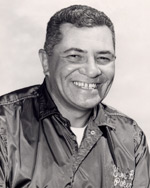
Vince Lombardi
The Super Bowl trophy was renamed the Vince Lombardi trophy, September 10.
Tom Dempsey of New Orleans kicked a game-winning NFL-record 63-yard field goal against Detroit, November 8.
1971
Baltimore defeated Dallas 16-13 on Jim O'Brien's 32-yard field goal with five seconds to go in Super Bowl V at Miami, January 17. The NBC telecast was viewed in an estimated 23,980,000 homes, the largest audience ever for a one-day sports event.
The NFC defeated the AFC 27-6 in the first AFC-NFC Pro Bowl at Los Angeles, January 24.
The Boston Patriots changed their name to the New England Patriots, March 25. Their new stadium, Schaefer Stadium, was dedicated in a 20-14 preseason victory over the Giants.
The Philadelphia Eagles left Franklin Field and played their games at the new Veterans Stadium.
The San Francisco 49ers left Kezar Stadium and moved their games to Candlestick Park.
Daniel F. Reeves, the president and general manager of the Rams, died at 58, April 15.
The Dallas Cowboys moved from the Cotton Bowl into their new home, Texas Stadium, October 24.
Miami defeated Kansas City 27-24 in sudden-death overtime in an AFC Divisional Playoff Game, December 25. Garo Yepremian kicked a 37-yard field goal for the Dolphins after 22 minutes, 40 seconds of overtime, as the game lasted 82 minutes, 40 seconds overall, making it the longest game in history.
1972
Dallas defeated Miami 24-3 in Super Bowl VI at New Orleans, January 16. The CBS telecast was viewed in an estimated 27,450,000 homes, the top-rated one-day telecast ever.
The inbounds lines or hashmarks were moved nearer the center of the field, 23 yards, 1 foot, 9 inches from the sidelines, March 23. The method of determining won-lost percentage in standings changed. Tie games, previously not counted in the standings, were made equal to a half-game won and a half-game lost, May 24.
Robert Irsay purchased the Los Angeles Rams and transferred ownership of the club to Carroll Rosen-bloom in exchange for the Baltimore Colts, July 13.
William V. Bidwill purchased the stock of his brother Charles (Stormy) Bidwill to become the sole owner of the St. Louis Cardinals, September 2.
The National District Attorneys Association endorsed the position of professional leagues in opposing proposed legalization of gambling on professional team sports, September 28.
Franco Harris's "Immaculate Reception" gave the Steelers their first postseason win ever, 13-7 over the Raiders, December 23.
1973
Rozelle announced that all Super Bowl VII tickets were sold and that the game would be telecast in Los Angeles, the site of the game, on an experimental basis, January 3.
Miami defeated Washington 14-7 in Super Bowl VII at Los Angeles, completing a 17-0 season, the first perfect-record regular-season and postseason mark in NFL history, January 14. The NBC telecast was viewed by approximately 75 million people.
The AFC defeated the NFC 33-28 in the Pro Bowl in Dallas, the first time since 1942 that the game was played outside Los Angeles, January 21.
A jersey numbering system was adopted, April 5: 1-19 for quarterbacks and specialists, 20-49 for running backs and defensive backs, 50-59 for centers and linebackers, 60-79 for defensive linemen and interior offensive linemen other than centers, and 80-89 for wide receivers and tight ends. Players who had been in the NFL in 1972 could continue to use old numbers.
NFL Charities, a nonprofit organi-zation, was created to derive an income from monies generated from NFL Properties' licensing of NFL trademarks and team names, June 26. NFL Charities was set up to support education and charitable activities and to supply economic support to persons formerly associated with professional football who were no longer able to support themselves.
Congress adopted experimental legislation (for three years) requiring any NFL game that had been declared a sellout 72 hours prior to kickoff to be made available for local televising, September 14. The legislation provided for an annual review to be made by the Federal Communications Commission.
The Buffalo Bills moved their home games from War Memorial Stadium to Rich Stadium in nearby Orchard Park. The Giants tied the Eagles 23-23 in the final game in Yankee Stadium, September 23. The Giants played the rest of their home games at the Yale Bowl in New Haven, Connecticut.
A rival league, the World Football League, was formed and was reported in operation, October 2. It had plans to start play in 1974.
O.J. Simpson of Buffalo became the first player to rush for more than 2,000 yards in a season, gaining 2,003.
1974
Miami defeated Minnesota 24-7 in Super Bowl VIII at Houston, the second consecutive Super Bowl championship for the Dolphins, January 13. The CBS telecast was viewed by approximately 75 million people.
Rozelle was given a 10-year contract effective January 1, 1973, February 27.
Tampa Bay was awarded a franchise to begin operation in 1976, April 24.
Sweeping rules changes were adopted to add action and tempo to games: one sudden-death overtime period was added for preseason and regular-season games; the goal posts were moved from the goal line to the end lines; kickoffs were moved from the 40- to the 35-yard line; after missed field goals from beyond the 20, the ball was to be returned to the line of scrimmage; restrictions were placed on members of the punting team to open up return possibilities; roll-blocking and cutting of wide receivers was eliminated; the extent of downfield contact a defender could have with an eligible receiver was restricted; the penalties for offensive holding, illegal use of the hands, and tripping were reduced from 15 to 10 yards; wide receivers blocking back toward the ball within three yards of the line of scrimmage were prevented from blocking below the waist, April 25.
Seattle was awarded an NFL franchise to begin play in 1976, June 4. Lloyd W. Nordstrom, president of the Seattle Seahawks, and Hugh Culverhouse, president of the Tampa Bay Buccaneers, signed franchise agreements, December 5.
The Birmingham Americans defeated the Florida Blazers 22-21 in the WFL World Bowl, winning the league championship, December 5.
1975
Pittsburgh defeated Minnesota 16-6 in Super Bowl IX at New Orleans, the Steelers' first championship since entering the NFL in 1933. The NBC telecast was viewed by approximately 78 million people.
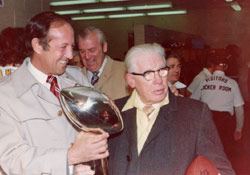
Commissioner Pete Rozelle awards the Super Bowl trophy to Steelers owner Art Rooney.
The Memphis Southmen of the WFL signed Larry Csonka, Jim Kiick, and Paul Warfield of Miami, March 31.
The divisional winners with the highest won-loss percentage were made the home team for the divisional playoffs, and the surviving winners with the highest percentage made home teams for the championship games, June 26.
Referees were equipped with wireless microphones for all preseason, regular-season, and playoff games.
The Lions moved to the new Pontiac Silverdome. The Giants played their home games in Shea Stadium. The Saints moved into the Louisiana Superdome.
The World Football League folded, October 22.
1976
Pittsburgh defeated Dallas 21-17 in Super Bowl X in Miami. The Steelers joined Green Bay and Miami as the only teams to win two Super Bowls; the Cowboys became the first wild-card team to play in the Super Bowl. The CBS telecast was viewed by an estimated 80 million people, the largest television audience in history.
Lloyd Nordstrom, the president of the Seahawks, died at 66, January 20. His brother Elmer succeeded him as majority representative of the team.
The owners awarded Super Bowl XII, to be played on January 15, 1978, to New Orleans. They also adopted the use of two 30-second clocks for all games, visible to both players and fans to note the official time between the ready-for-play signal and snap of the ball, March 16.
A veteran player allocation was held to stock the Seattle and Tampa Bay franchises with 39 players each, March 30-31. In the college draft, Seattle and Tampa Bay each received eight extra choices, April 8-9.
The Giants moved into new Giants Stadium in East Rutherford, New Jersey.
The Steelers defeated the College All-Stars in a storm-shortened Chicago College All-Star Game, the last of the series, July 23. St. Louis defeated San Diego 20-10 in a preseason game before 38,000 in Korakuen Stadium, Tokyo, in the first NFL game outside of North America, August 16.
1977
Oakland defeated Minnesota 32-14 in Super Bowl XI at Pasadena, January 9. The paid attendance was a pro record 103,438. The NBC telecast was viewed by 81.9 million people, the largest ever to view a sports event. The victory was the fifth consecutive for the AFC in the Super Bowl.
The NFL Players Association and the NFL Management Council ratified a collective bargaining agreement extending until 1982, covering five football seasons while continuing the pension plan-including years 1974, 1975, and 1976-with contributions totaling more than $55 million. The total cost of the agreement was estimated at $107 million. The agreement called for a college draft at least through 1986; contained a no-strike, no-suit clause; established a 43-man active player limit; reduced pension vesting to four years; provided for increases in minimum salaries and preseason and postseason pay; improved insurance, medical, and dental benefits; modified previous practices in player movement and control; and reaffirmed the NFL Commissioner's disciplinary authority. Additionally, the agreement called for the NFL member clubs to make payments totaling $16 million the next 10 years to settle various legal disputes, February 25.
The San Francisco 49ers were sold to Edward J. DeBartolo, Jr., March 28.
A 16-game regular season, 4-game preseason was adopted to begin in 1978, March 29. A second wild-card team was adopted for the playoffs beginning in 1978, with the wild-card teams to play each other and the winners advancing to a round of eight postseason series.
The Seahawks were permanently aligned in the AFC Western Division and the Buccaneers in the NFC Central Division, March 31.
The owners awarded Super Bowl XIII, to be played on January 21, 1979, to Miami, to be played in the Orange Bowl; Super Bowl XIV, to be played January 20, 1980, was awarded to Pasadena, to be played in the Rose Bowl, June 14.
Rules changes were adopted to open up the passing game and to cut down on injuries. Defenders were permitted to make contact with eligible receivers only once; the head slap was outlawed; offensive linemen were prohibited from thrusting their hands to an opponent's neck, face, or head; and wide receivers were prohibited from clipping, even in the legal clipping zone.
Rozelle negotiated contracts with the three television networks to televise all NFL regular-season and postseason games, plus selected preseason games, for four years beginning with the 1978 season. ABC was awarded yearly rights to 16 Monday night games, four prime-time games, the AFC-NFC Pro Bowl, and the Hall of Fame games. CBS received the rights to all NFC regular-season and postseason games (except those in the ABC package) and to Super Bowls XIV and XVI. NBC received the rights to all AFC regular-season and postseason games (except those in the ABC package) and to Super Bowls XIII and XV. Industry sources considered it the largest single television package ever negotiated, October 12.
Chicago's Walter Payton set a single-game rushing record with 275 yards (40 carries) against Minnesota, November 20.
1978
Dallas defeated Denver 27-10 in Super Bowl XII, held indoors for the first time, at the Louisiana Superdome in New Orleans, January 15. The CBS telecast was viewed by more than 102 million people, meaning the game was watched by more viewers than any other show of any kind in the history of television. Dallas's victory was the first for the NFC in six years.
According to a Louis Harris Sports Survey, 70 percent of the nation's sports fans said they followed football, compared to 54 percent who followed baseball. Football increased its lead as the country's favorite, 26 percent to 16 percent for baseball, January 19.
A seventh official, the side judge, was added to the officiating crew, March 14.
The NFL continued a trend toward opening up the game. Rules changes permitted a defender to maintain contact with a receiver within five yards of the line of scrimmage, but restricted contact beyond that point. The pass-blocking rule was interpreted to permit the extending of arms and open hands, March 17.
A study on the use of instant replay as an officiating aid was made during seven nationally televised preseason games.
The NFL played for the first time in Mexico City, with the Saints defeating the Eagles 14-7 in a preseason game, August 5.
Bolstered by the expansion of the regular-season schedule from 14 to 16 weeks, NFL paid attendance exceeded 12 million (12,771,800) for the first time. The per-game average of 57,017 was the third-highest in league history and the most since 1973.
1979
Pittsburgh defeated Dallas 35-31 in Super Bowl XIII at Miami to become the first team ever to win three Super Bowls, January 21. The NBC telecast was viewed in 35,090,000 homes, by an estimated 96.6 million fans.
The owners awarded three future Super Bowl sites: Super Bowl XV to the Louisiana Superdome in New Orleans, to be played on January 25, 1981; Super Bowl XVI to the Pontiac Silverdome in Pontiac, Michigan, to be played on January 24, 1982; and Super Bowl XVII to Pasadena's Rose Bowl, to be played on January 30, 1983, March 13.
NFL rules changes emphasized additional player safety. The changes prohibited players on the receiving team from blocking below the waist during kickoffs, punts, and field-goal attempts; prohibited the wearing of torn or altered equipment and exposed pads that could be hazardous; extended the zone in which there could be no crackback blocks; and instructed officials to quickly whistle a play dead when a quarterback was clearly in the grasp of a tackler, March 16.
Rosenbloom, the president of the Rams, drowned at 72, April 2. His widow, Georgia, assumed control of the club.

